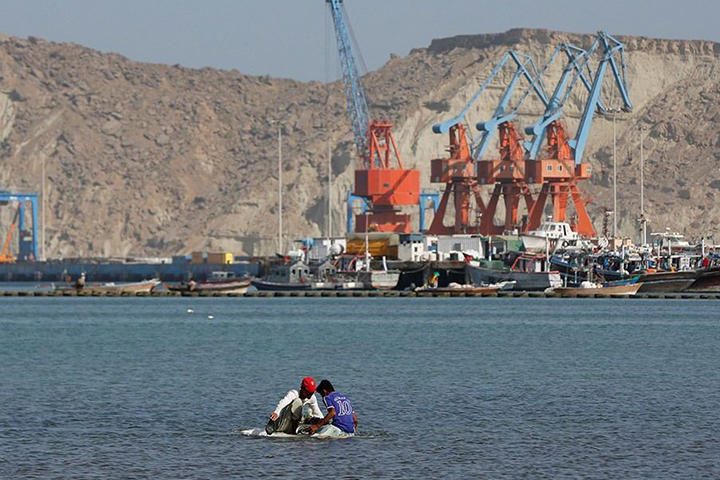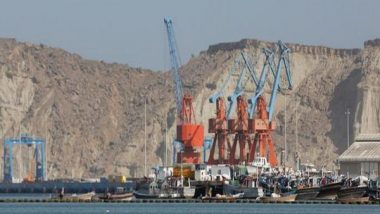Simmering Discontent Against CPEC and Gwadar Uprisings
A de facto curfew has been forced in Pakistan’s port town of Gwadar after a clampdown on a local rights movement, forming a shadow over a crucial destination for China’s Belt and Road infrastructure investment. The government of Balochistan, has imposed Section 144 of the Criminal Procedure Code, a draconian colonial-era law that permits a ban on all kinds of rallies and protests. Police have reportedly arrested over 100 supporters of the movement.
In addition, as reported on January 3, Police of Gwadar have registered an FIR against Haq Do Tehreek leader Maulana Hidayat ur Rehman on charges of murder, attempt to murder, provoking the people for violence and other charges.
For over 50 days, a sit-in protest outside the main entrance of the Gwadar port was ongoing before the protests turned violent during the last week of December, 2022 resulting in clashes between the police and the protesters. The sit-in was staged by the Haq Do Tehreek (Gwadar Rights Movement), which is appeared to be a popular activist movement over the last couple of years in the Gwadar city. Gwadar is extolled as the heart of the China-Pakistan Economic Corridor (CPEC) and widely seen as the main plank of China’s Belt and Road Initiative (BRI), but local people of Balochistan have long felt cut off from any benefits and paybacks that status bequeaths on Gwadar.
The city is often projected as a ‘future Dubai’ in the region, but the increasing poverty of its people tells a different story. Gwadar’s people remain deprived of access to clean water and other rudimentary facilities. Unfortunately, Gwadar being a center of economic development didn’t manage to change the fate of its people. Rather, it became the cause of frustration over local people’s estrangement from the local development projects, which are mostly managed by the Chinese or officers from other provinces of Pakistan.
The Haq Do Tehreek has been staging protests for several demands, including the banning of illegal trawlers in Balochistan’s waters, a reduction of security checkpoints, as well as the liberalization of trade with neighbouring Iran.
Balochistan is territorially the largest province of Pakistan. It is rich in natural resources and thinly populated. In recent decades, the people of this province have alleged that non-Balochis, especially those from Punjab, rule over the province and the benefits of economic developments do not reach the locals. As a result, the province is home to a low-intensity but tenacious insurgency movement. The Pakistani government, particularly the military and its intelligence agencies, has picked up Balochistan’s educated people and civil society activists, who often disappear without a trace. Pakistani military ruler General Pervez Musharraf worsened the issue further by ordering the assassination in August 2006 of Nawab Akbar Bugti, a widely respected Balochi leader who had served as the province’s governor and chief minister as well as the defence minister of Pakistan.
The residents of Gwadar from all walks of life experience desolation also. One of those issues is the omnipresent refrain of “Kaha ja rahe ho? Kaha se a rahe ho?” (Where are you going? Where are you coming from?). This attitude symbolizes the constant surveillance that the people were under within their own city, being interrogated constantly at security checkpoints. Also, the fishermen have been facing numerous problems, like being required to have tokens and being assigned fixed time for accessing the sea for fishing. Residents of the port city also complain about being deprived of basic facilities, from healthcare to electricity to clean drinking water.
Worryingly, earlier in 2016, the Federation of Pakistan Chambers of Commerce and Industry (FPCCI) endorsed the anxiety of demographic change in their report, which predicted Chinese would outnumber native Baloch by the year 2048.[8] The FPCCI report said conservatively 0.44 persons per thousand migrate from China because of economic reasons that verifies the inflow of more than 600,000 people per year in Pakistan after operating the CPEC.
Led by Maulana Hidayat ur Rehman Baloch leader of Haq Do Tehreek, (he is also the general secretary of Jamaat-e-Islami in Balochistan) who has emerged as a popular face of resistance among the masses, the demonstrators blocked the main airport road, and the road leading to the port. The Maulana had also asked the Chinese to leave the airport. He is critical of the heightened security and pointless check posts in the port city of the country as well.
The sit-in was peaceful until Rehman closed the main entry road to Gwadar port and asked Chinese nationals to leave the port city. Rehman and his followers also showed up with weapons and threatened armed resistance if their demands were not met.
The Gwadar Rights Movement was established in August 2021 to protest on behalf of the local population, voicing protests.
In 2021, Hidayat ur Rehman, led a similar protest that lasted for 32 days. Some improvement was made, but many of the issues continued to aggravate. On October 27, 2022, Rehman and his followers started another sit-in, condemning the government of going back on its promises. When the sit-in entered its 25th day, tens of thousands of protesters, including women and children, blocked an expressway leading to the Gwadar port as the government failed to meet the deadline to implement the demands.
Nevertheless, it continued to December and matters turned ugly on December 26, 2022 following a strike call, as police and the protesters faced off. The law enforcers resorted to tear-gassing demonstrators as a mob tried to attack a police station, resulting in several arrests. While critics say the Hidayat ur Rehman, has political aspirations, the fact is that he has struck a chord with the people of Makran, who feel the establishment-backed politicians, as well as the nationalists, have failed to deliver.
Gwadar has also been cut off from the rest of the country as the authorities have suspended not only the internet service and the mobile phone networks but also the landline in all four port cities of the Makran division–Gwadar, Jevani, Pasni and Ormara.
The global human rights watchdog, Amnesty International, stated alarm over the reports of mass arrests and the imposition of the emergency law in Gwadar. “Putting a blanket ban on all forms of public gatherings amounts to repression of the right to protest and sends a chilling message that there is no room for dissent,” the organization said in a tweet.
Significantly, Balochistan High Court (BHC) has expressed its resentment over the police crackdown in Gwadar and asked the deputy commissioners of Gwadar and Kech as well as their police officials to submit their written explanations by January 15, 2023. A division bench of the BHC, including Justice Hashim Khan Kakar and Justice Shaukat Rakhshani, delivered this order while hearing a petition filed by senior lawyers, Amanullah Kunrani and Rahib Buledi.
In reality, instead of false promises, the people of Balochistan need action on the ground, so that they can be beneficiaries of progress and development in their own province. Bearing in mind the decades of neglect, it will take time to address the people’s grievances, but the government needs to deal with the matters with utmost care, empathy and amicably rather than resorting to the use of violence with a vengeance, unwarranted coercion and persecution.
Source: al arabiya post
15 Jan 2023,20:30
















 Live Tv
Live Tv




